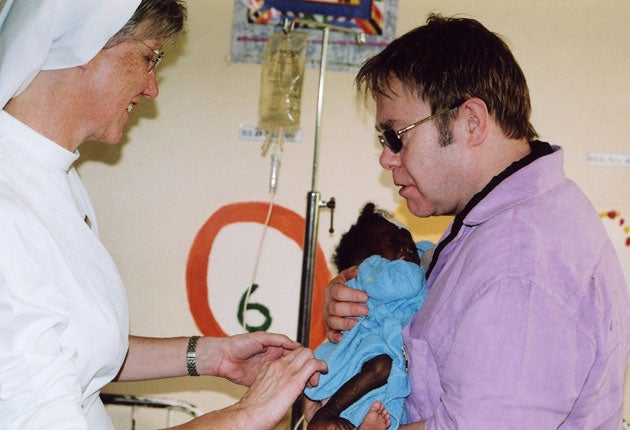Our journey – and why there's still a long way to go
Anne Aslett, director of the Elton John Aids Foundation, explains the charity's work, and how a young man inspired it

Your support helps us to tell the story
From reproductive rights to climate change to Big Tech, The Independent is on the ground when the story is developing. Whether it's investigating the financials of Elon Musk's pro-Trump PAC or producing our latest documentary, 'The A Word', which shines a light on the American women fighting for reproductive rights, we know how important it is to parse out the facts from the messaging.
At such a critical moment in US history, we need reporters on the ground. Your donation allows us to keep sending journalists to speak to both sides of the story.
The Independent is trusted by Americans across the entire political spectrum. And unlike many other quality news outlets, we choose not to lock Americans out of our reporting and analysis with paywalls. We believe quality journalism should be available to everyone, paid for by those who can afford it.
Your support makes all the difference.The beginnings of the Elton John Aids Foundation (EJAF) are well known. Elton was deeply touched by the plight of a young US haemophiliac, Ryan White, who contracted HIV through contaminated blood and was vilified by his entire community.
Elton befriended Ryan and his family and was so touched by the forgiving and gentle way they responded to their plight, it fired his resolve to set up his foundation in 1992. Many of Elton's friends have succumbed to Aids, among them Freddie Mercury of Queen. EJAF began distributing money in the US and UK to charities that could alleviate the physical, emotional and material suffering caused by the disease.
Over the 18 years since, EJAF has distributed funds in 17 countries across Africa, Asia, Europe and the Americas. More than $220m (£141m) raised has supported 1,200 programmes and attracted almost $500m in additional support. The Foundation has grown from a charity that aimed, at best, to educate people to the dangers of HIV and ease the suffering of those with the disease, to a strategic funder that in 2009-10 supported a programme reaching 300,000 of Africa's HIV-positive pregnant women to prevent them passing the HIV virus to their unborn babies. With the independence of a private charity, we have championed politically sensitive or unpopular causes, including needle-exchange programmes, sex workers, prisoners and gay men. That has "normalised" such support for much bigger donors than us, including the Gates Foundation.
In 2008, we prioritised HIV-infected children and, working with partners such as the Clinton Health Access Initiative, we have helped 150,000 HIV-positive children in Africa access life-saving medication. We have provided information about HIV/Aids to 150 million people via newsletters, websites, ebulletins, books and posters, and helped establish the Ukrainian Network of People Living with HIV/Aids, that now shares responsibility with the Ukrainian Ministry of Health for administering $75m for treatment of patients with HIV. But this disease affects so much more, including nutrition, education, human rights, shelter and poverty.
We have tried to operate economically, spending less than 5 per cent on overheads and pushing for sponsorship. Much of the work featured in this issue is connected to EJAF. We are privileged to join not only them but thousands more inspired individuals and progressive organisations doing fantastic work in the fight against HIV. We salute these efforts and thank you, from the bottom of our hearts, for your support.
For further information tel 020 7603 9996, or email admin@ejaf.com
Join our commenting forum
Join thought-provoking conversations, follow other Independent readers and see their replies
Comments